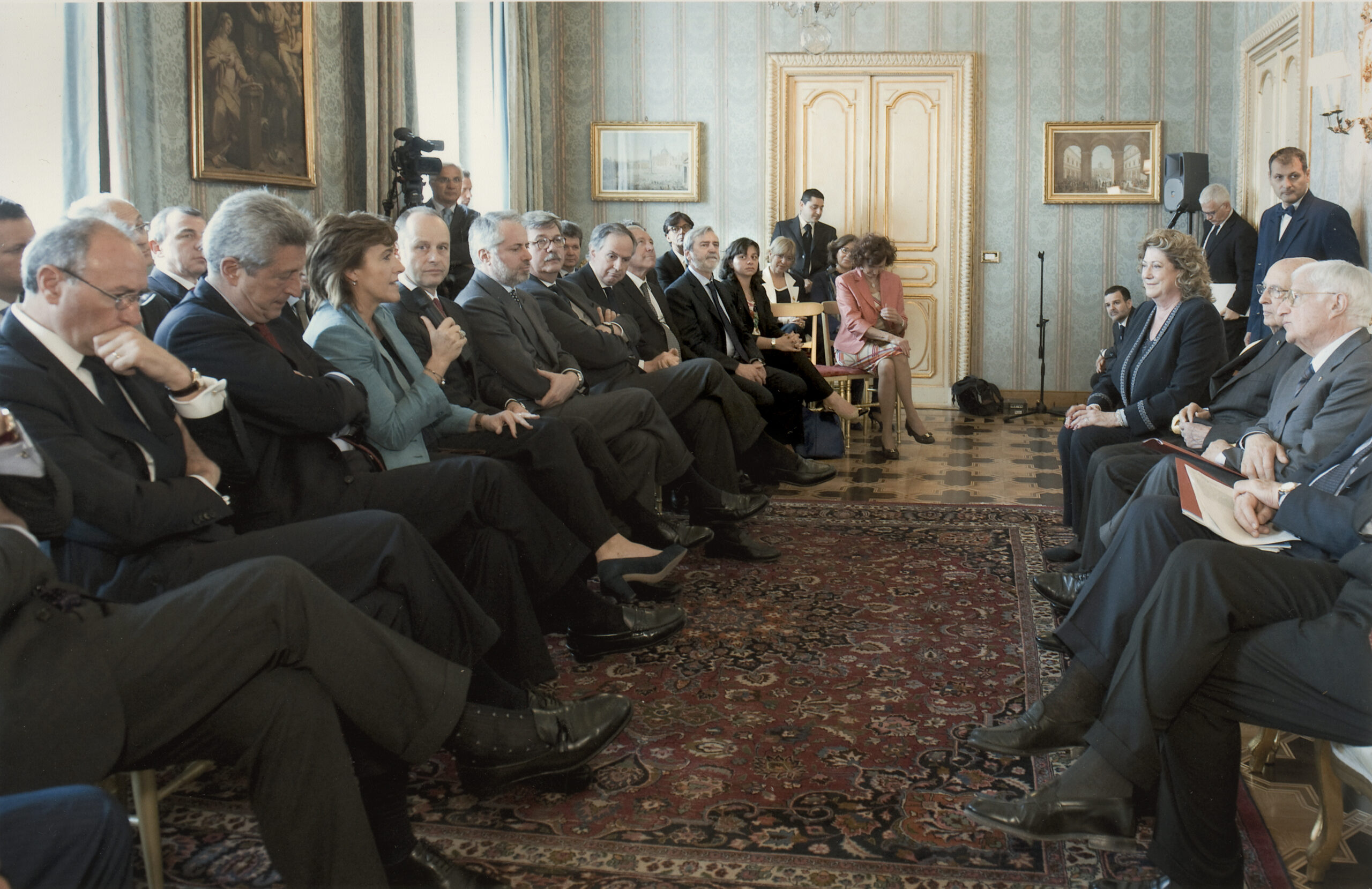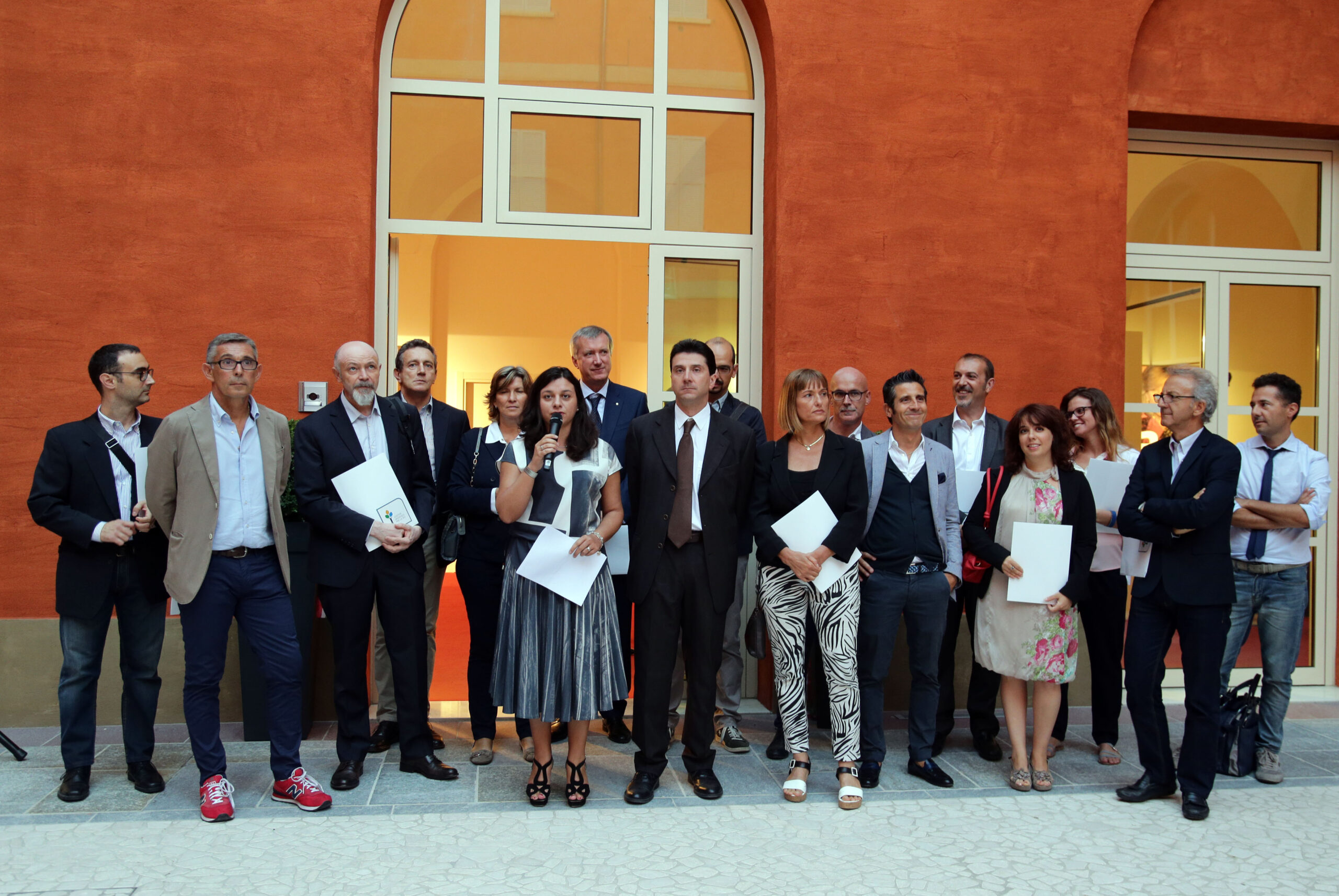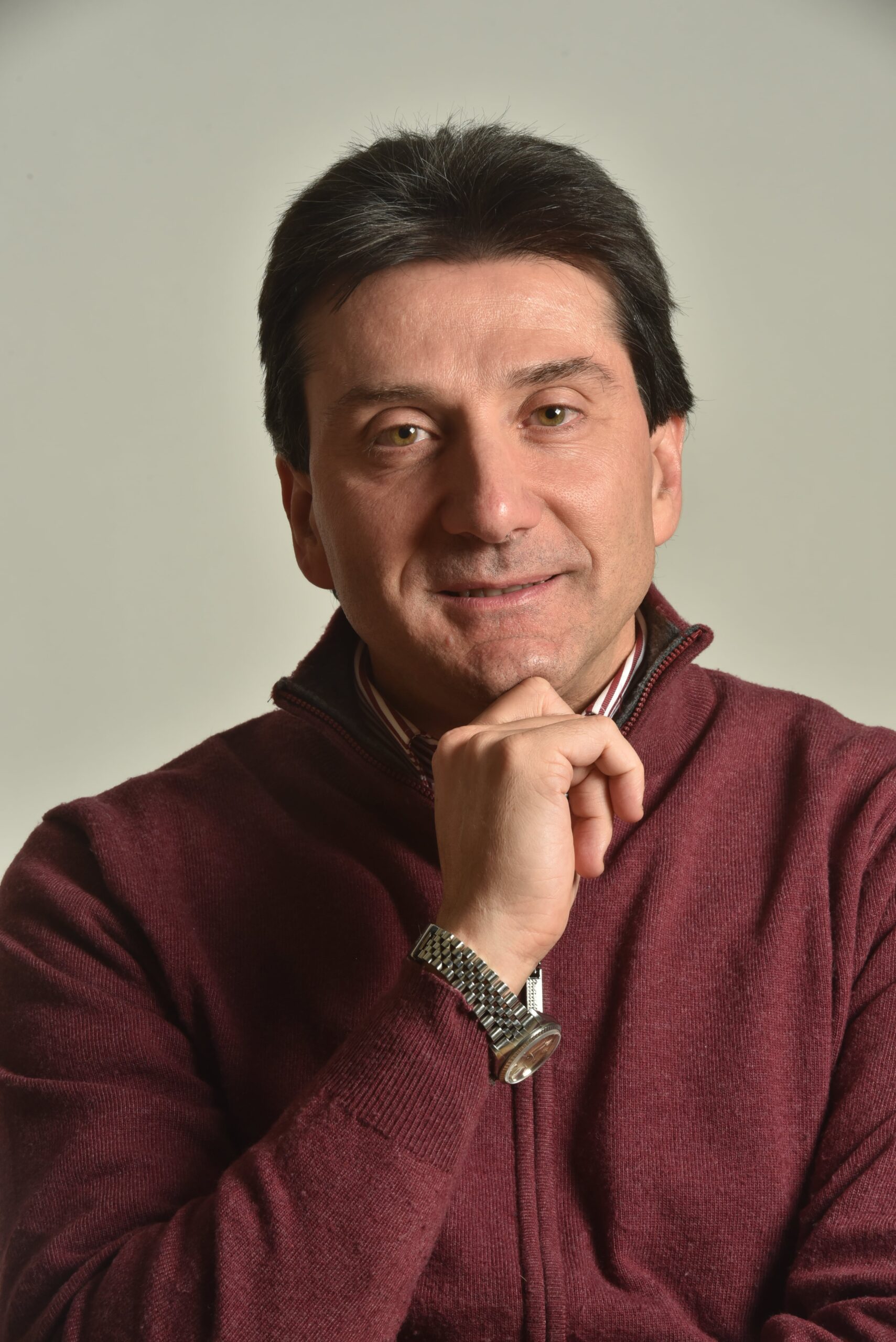In my opinion, one of the nicest features of Facebook is “On This Day”, that allows social users to relive the experiences of the past, showing at midnight what happened to them on this same day in previous years, last year, two years ago … ten years ago.
This photo appeared to me.

In the picture: Elena Salda with Sodalitas companies delegation in a meeting with President Napolitano.
Exactly on May 15th 2012 I was in the “Sala della Pendola” of Quirinale with a delegation of 35 companies of Sodalitas, in a meeting with the President of the Republic Giorgio Napolitano.
The purpose of the meeting was to enhance the role of our companies involved in Social Responsibility initiatives. I remember that we introduced to the President our projects, concerning important issues such as safety in the workplace, equal opportunities, fight against corruption and we talked about the results obtained thanks to investments in sustainability matters.
For over ten years, my company, C.M.S S.p.a, has been engaging with Corporate Social Responsibility. It is one of our values and we are committed to making it concrete with many welfare and environmental projects and initiatives.
In those same years I was lucky enough to meet other entrepreneurs of Modena who shared my ideas about Corporate Social Responsibility. Together, we created the ìAssociazione per la RSI, an almost unique reality in Italy, with the aim of spreading and promoting the culture of sustainability. We did it when few still knew the term “sustainability”.

In this picture of 2014, Elena Salda with Claudio Testi (on the right) and the other founding member of the Associazione per la Responsabilità Sociale di Impresa.
Since then, the Agenda 2030 for Sustainable Development, signed by 193 UN countries, has been giving an indisputable impulse towards these principles. An action program for people and for our planet including 17 goals on important issues, such as fight against poverty, hunger and climate change, to name just a few.
Today, with Italy’s Presentation of the Recovery and Resilience Plan, the words “sustainability”, “ecological transition”, “inclusion” and “cohesion” have become part of the common language.
Where are we at?
Let’s talk with Mr. Claudio Testi about corporate social responsibility, sustainability, happiness. Claudio is multi-talented man. First of all, he is a friend, a person with a witty and lively intelligence, always open-minded.
Claudio is sole director of Socfeder S.p.A, a leader company in steel products trade.
He also has a degree and a doctorate in Philosophy from the University of Bologna and, cultivating this passion, he became over the years president of the “Istituto Filosofico di Studi Tomistici” of Modena and vice president of the “Associazione Italiana di Studi Tolkieniani” with several publications to his credit.
Currently, he is president of the Associazione per la RSI.

In the picture, Claudio Testi
Sustainability
Claudio let’s start from the present. In your opinion, what is the level of understanding of the term “sustainability”? How ready are we as people, companies, nations to pursue the goals of the 2030 agenda?
Today everything has magically become “sustainable”: you can read it on products, in advertisements, in economic and other speeches. We are facing a trend, but a positive trend, because this word, beyond its abuse, really includes positive values and choices. “Sustainability” roughly means a simultaneous attention to economic-social-environmental factors: I don’t know how many people are aware of it. In any case, the word has never thrilled me because if something is not sustainable, then it is bound to end on its own. On the other hand, “Corporate Social Responsibility” points out everything positive that is done for society beyond legal obligation: this is why I find the concept (even if almost “outdated”) much more effective. In fact, today sustainability is practically mandatory, while CSR can never be and therefore it is “free”.
Covid-19 Pandemic
The Covid-19 pandemic has shown that we cannot keep on acting without taking into account the context in which we find ourselves, because we are all interconnected. On the other hand, it has also caused an increase in the gap between rich and poor with a social disparity tightening, from both an economic point of view and right to healthcare.
I remember, as certainly many other people in the world, the harsh warning pronounced last March, in full Covid-emergency, by Pope Francis. A lonely man, in the rain, in the churchyard of Basilica di San Pietro. A deserted square.
“In this world we have moved forward at full speed, feeling strong and all-powerful. Greedy of gain, we let ourselves be absorbed by things and confused by hurry.
We did not stop in front of your recalls, we did not complain against planetary wars and injustices, we did not listen to the cry of the poor and our seriously ill planet.
We continued undaunted, believing we could remain healthy in a sick world.”
Do you think the pandemic has really changed us? Is it possible that we can learn a lesson to improve our future?
The pandemic has changed us and it is changing us in an important way even if, perhaps just because we are still immersed in this process, we cannot fully understand it.
Covid has speeded up processes already in progress: an increase in “individualism” at the expense of a complex social dimension, physically impossible due to the lockdown, an increasing life in the virtual world of the web, a greater control everywhere. Someone spoke about a “Great reset”: with Covid a lot of things have been reset and therefore you can more easily take one road or another. I think we took the wrong road, while we could really go towards a redefinition of socio-economic assets in environmental and human function: with the first lockdown we have all seen that, if we stop for a while, nature immediately blooms again, air magically becomes breathable, in Modena too: why does nobody remember it?
Happiness
Our “Associazione per la RSI” has proposed some very interesting webinars in last months. In particular, I refer to “Le Parole dell’economia civile” hold by Sabrina Bonomi, Associate Professor of Business Organization, senior Consultant & trainer, Co-founder of the “Scuola di Economia Civile” and “Il Calcolo felice” by Ulpiana Kocollari, Associate Professor at the Marco Biagi Department of Economics of Modena.
Both of them state that economic measures are not enough to capture and manage the value produced by organizations, but that a paradigm shift is needed. Short-term development without any attention to long-term consequences has shown limits: not only a growing inequality in the distribution of economic results but also a deterioration of natural environment. In addition, peoples living in a country – let’s say developed – even if richer aren’t happy anymore.
What should the new paradigm be, in your opinion? Can happiness really be a goal to strive for?
In my opinion, the matter of happiness that we are pursuing is decisive, albeit pioneering: I think we are among the first ones to try to measure the happiness produced for small and medium-sized companies (for States it was already done). To improve our world, it is also necessary to change the measurement criterion. When we hear a European politician saying “I want to increase the happiness of the nation, regardless of economic growth”, then it will mean that something has really changed and a drop in the bucket will be also our Association’s merit. To answer your question: today the economic paradigm is still based on “growth” (which unfortunately is often confused with “development”, which is much broader): I hope that also thanks to the UN 2030 Agenda this reductive horizon will disappear to be replaced by more “humanly complete” words and in this sense “happiness” can be very effective.
In 1972, the king of the small Asian state of Bhutan created a new indicator to measure the level of Gross Nation Happiness of its citizens. In more than 40 years, the GNH has transformed itself from a philosophy of life to a crucial element for the economic development of the country. As Mrs. Kocollari reminded us, today the GNH is an indicator adopted by the United Nations. In this ranking, Italy is in 28th place. It seems incredible that in our beautiful country, where we live and we eat so well, we are not happy.
What do you think about happiness calculation? Is this a utopia to be applied just to a small country like Bhutan or will there be other governments so brave to follow this path?
It is not a utopia: as association, in our small way, we are really doing it! We are not sure to succeed, but if we don’t start, we certainly won’t get any result. About politicians, as I said above, I can’t make predictions. As far as I am concerned, if a politician really takes care of the matter, he seriously could be successful with the electorate, too. Today, especially young people are much more sensitive to certain issues (environment, sustainability, equity) and I am convinced they would appreciate. Let’s say, only time will tell: but as long as we live, let’s try to point to the happiest direction.
Companies
We are entrepreneurs. Our daily life is based on numbers: how much we produce, how much we invoice, how much money we borrow from the banks, how many employees we can pay at the end of the month. Markets do not forgive us any distraction.
Can we really afford to think about happiness? And above all, why should we invest on our employees happiness?
I think the question should be reversed: can we afford NOT to think about happiness? I find crazy that on economic and social level we do not ìreallyî think about happiness and its measurement and increase, but we rather keep on speaking just about “growth” or “income”. There are Nobel Prizes who showed how income growth at some point produces unhappiness: this is the reason why we must measure and increase the happiness of all those involved in the company: not only employees but also suppliers, customers and shareholders. Happiness is living a complete, full and satisfying life: what else should politics and economy pursue?
I conclude my talk with Claudio taking up his challenge to happiness and making a wish to all of us: may we find our own way to be bravely happy.





